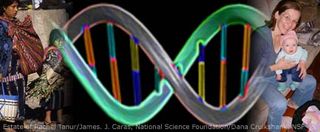DNA and Genes

Genes are the blueprints of life. Genes control everything from hair color to blood sugar by telling cells which proteins to make, how much, when, and where. Genes exist in most cells. Inside a cell is a long strand of the chemical DNA (deoxyribonucleic acid). A DNA sequence is a specific lineup of chemical base pairs along its strand. The part of DNA that determines what protein to produce and when, is called a gene.
First established in 1985 by Sir Alec Jeffreys, DNA testing has become an increasingly popular method of identification and research. The applications of DNA testing, or DNA fingerprinting within forensic science is often what most people think of when they hear the phrase. Popularized by television and cinema, using DNA to match blood, hair or saliva to criminals is one purpose of testing DNA. It is also frequently used for other benefits, like wildlife studies, paternity testing, body identification, and in studies pertaining to human dispersion.While most aspects of DNA are identical in samples from all human beings, concentrating on identifying patterns called microsatellites reveals qualities specific and unique to the individual. During the early stages of this science, a DNA test was performed using an analysis called restriction fragment length polymorphism. Because this process was extremely time consuming and required a great deal of DNA, new methods like polymerase chain reaction and amplified fragment length polymorphism have been employed.The benefits of DNA testing are ample. In 1987, Colin Pitchfork became the first criminal to be caught as a result of DNA testing. The information provided with DNA tests has also helped wrongfully incarcerated people like Gary Dotson and Dennis Halstead reclaim their freedom.
Latest about Genetics

Europeans' ancient ancestors passed down genes tied to multiple sclerosis, Alzheimer's risk
By Emily Cooke published
New research suggests that the risk of Europeans developing diseases such as multiple sclerosis and Alzheimer's stems from ancient human migrations.

Gene variant guards against Parkinson's and could lead to therapies
By Nicoletta Lanese published
A study uncovers the likely reasons why a rare genetic quirk is tied to protection against Parkinson's disease.

The world's 1st CRISPR therapy has been approved. Here's everything you need to know
By Emily Cooke last updated
Drug regulators have approved a CRISPR therapy called Casgevy to treat inherited blood disorders. But what is it and how does it work?

188 new types of CRISPR revealed by algorithm
By Nicoletta Lanese published
Researchers used an algorithm to scour databases of bacterial genomes for never-before-seen CRISPR systems.

Genetic risks behind 'cannabis use disorder' found in huge study
By Nicoletta Lanese published
In a study that included genetic data from more than 1 million people, scientists started to unravel the genetics of cannabis use disorder.

Do redheads really need more anesthesia?
By Donavyn Coffey published
Redheads are said to experience pain differently than other people and require higher doses of pain medications, depending on the drug used. Why?

Endometriosis and gut disorders have a genetic link
By Emily Cooke published
A new study has revealed specific gene variants associated with a higher risk of both endometriosis and several digestive disorders, such as IBS and GERD.

Neanderthal DNA may shape how sensitive you are to pain, genetic analysis shows
By Carissa Wong published
Scientists studied genetic samples from more than 7,000 people and linked three genetic variants, inherited from Neanderthals, to increased pain sensitivity.
Sign up for the Live Science daily newsletter now
Get the world’s most fascinating discoveries delivered straight to your inbox.
